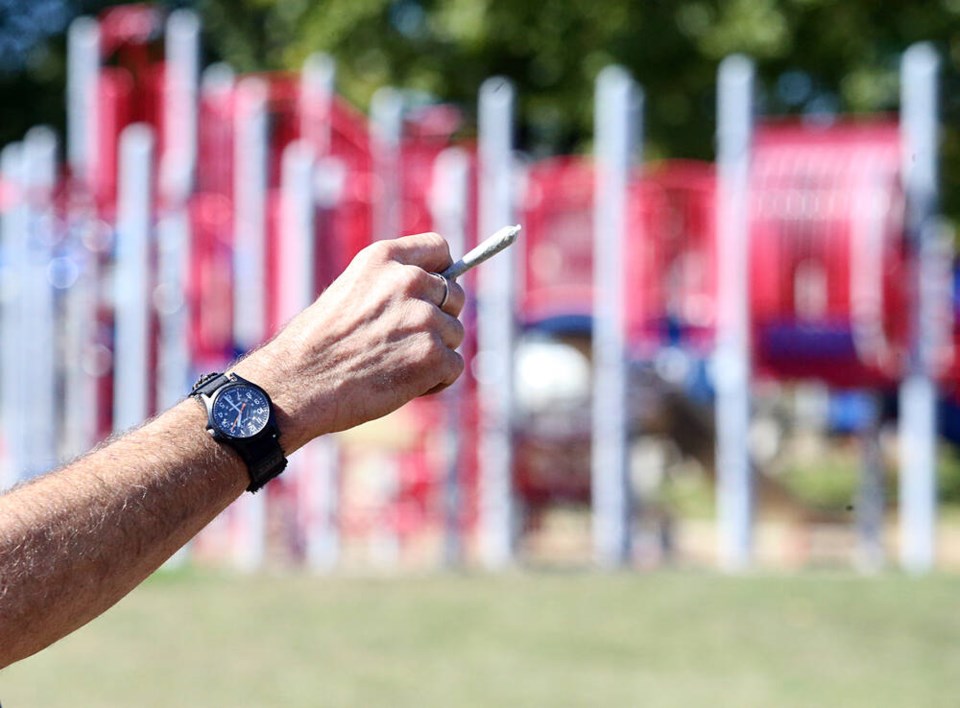The province is introducing new legislation banning use of street drugs in more areas, including within six metres of building entrances and bus stops.
The province unveiled its planned legislation on Thursday after hearing from unhappy municipalities, police and others concerned about public use of illicit drugs. The proposal also prohibits open drug use within 15 metres of playgrounds, spray parks, wading pools and skate parks, as well as parks, beaches and sports fields.
In January, the province, with approval from Health Canada, introduced a three-year pilot program to decriminalize carrying small amount of illicit drugs. In response, some local governments brought in their own rules prohibiting drug use in specific areas, such as playgrounds and parks, but the province says it wants to see one set of rules throughout B.C.
“We need a province where people feel secure in our communities, [when] they go to the park, that it’s a safe and welcoming place for them and for their families.
“Also, we need our province to be a place that is one of compassion and empathy for people struggling with addiction.”
Public Safety Minister Mike Farnworth said the new legislation would allow police officers to ask someone using drugs in any of the prohibited places to go to an overdose-prevention or supervised-consumption site instead. “If a person refuses this direction, the police officer may choose to proceed with enforcement measures, if appropriate,” the province said in a statement.
Eby said the government is willing to work with local leaders to ensure drug users are directed to safe places with services attached, but one challenge is that some communities are not interested in having overdose-prevention sites.
“I hope with this legislation that they recognize how these pieces are going to work together to be able to support people, get them into the right place and connect them into the system to get the care they need.”
The B.C. Coroners Service has said the province is seeing about 5.6 deaths from toxic drugs every day, with 174 deaths recorded in August.
The province said the new legislation will make it clear to local governments they will be expected to consult with their area’s medical health officer and regional health authority before considering passing any additional bylaws addressing public use of illegal drugs.
Nanaimo Acting Mayor Paul Manly responded to the province’s announcement by expressing frustration at the lack of treatment beds for those with addictions.
“We need to have treatment facilities, detox facilities, overdose-prevention sites, shelters and places where people can be when they are in the middle of an addiction, [where] they can use drugs safely and not on our streets and not in our parks.
“It’s going to take a lot more than giving tools to bylaw, police and our community safety officers” to move people around from one area to another, said Manly, who runs a shelter.
“We see people coming out of an overdose or ready to seek help and they can’t get a treatment bed and it’s worse for women than it is for men.”
Kermit Dahl, mayor of Campbell River, which started work on its own bylaw in February to ban drug use in certain city-owned sites where children and families congregate, welcomed the new legislation.
“It is encouraging to see the province taking action on this important issue following calls from residents and local governments across B.C., including the City of Campbell River council,” Dahl said. “As a local government, we felt it was important to respond to calls for quick action to maintain the use and enjoyment of public spaces by the entire community.”
Campbell River will continue working with other levels of government to address the toxic drug crisis while supporting the community’s residents, Dahl said.
Victoria Mayor Marianne Alto said the province has “heard the concerns from people and municipalities on the use of illegal drugs in public spaces,” and the new legislation will help keep communities safer for everyone, while more supportive services are offered across B.C.
>>> To comment on this article, write a letter to the editor: [email protected]



